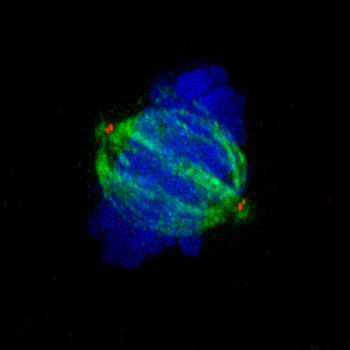Genomic instability and premature aging
Premature aging syndromes often result from mutations in nuclear proteins involved in genomic integrity. For example Hutchinson-Gilford progerial syndrome (HGPS), a severe form of early-onset premature aging, is caused by truncation in the protein lamin A. Lamin A is a nuclear protein important for chromatin attachment, DNA replication and nuclear organization. Lack of an enzyme responsible for the maturation of prelamin A, also results in progeroid phenotypes in mice and humans.
In Nature Medicine Online researchers at Karolinska Institutet and the University of Hong Kong describe this enzyme's importance for the stability of DNA. The results indicate that mutations in prelamin A and lamin A perturb DNA damage response and repair, resulting in genomic instability which might contribute to certain types of premature aging.
Original publication: B. Liu , J. Wang, K. M. Chan, W. M. Tjia, W. Deng, X. Guan, J. Huang, K. M. Li, P. Y. Chau, D. J. Chen, D. Pei, A. M. Pendas, J. Cadinanos, C. Lopez-Otin, H. F. Tse, C. Hutchinson, J. Chen, Y. Cao, K. S. E. Cheah, K. Tryggvason, Z. Zhou; " Genomic instability in laminopathy-based premature aging"; Nature Medicine Online 26 June, 2005.
Most read news
Organizations
Other news from the department science

Get the life science industry in your inbox
By submitting this form you agree that LUMITOS AG will send you the newsletter(s) selected above by email. Your data will not be passed on to third parties. Your data will be stored and processed in accordance with our data protection regulations. LUMITOS may contact you by email for the purpose of advertising or market and opinion surveys. You can revoke your consent at any time without giving reasons to LUMITOS AG, Ernst-Augustin-Str. 2, 12489 Berlin, Germany or by e-mail at revoke@lumitos.com with effect for the future. In addition, each email contains a link to unsubscribe from the corresponding newsletter.
More news from our other portals
Last viewed contents
Louis_K._Liggett

TSKgel FCR-IIIA columns | Affinity chromatography columns | Tosoh

Think Pink! Success of pink bacteria in oceans of the world - Efficient strategies for survival through plasmid-mediated gene transfer
List_of_Cycloctenidae_species
List_of_Hexathelidae_species
List_of_Tetrablemmidae_species
Charles_Kelman























































